CIA Sponsored Terror, Civil Liberties, Guantanamo, Supreme Court, Targeting Muslims, Torture, U.S. Militarism, Violations of U.S. and International Law, worker's rights
Podcast: Play in new window | Download

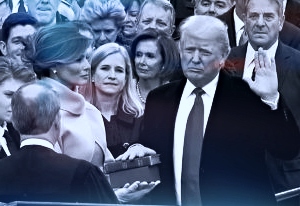
Present Danger Of Fascism In The United States
The rise of Donald Trump and his MAGA supporters has transformed American politics, perhaps more than anything else has since the gathering of forces of the rebellious slave owners in the south, a century and a half ago. His first four years in office were chaotic, uninformed programmatically, and not animated by any kind of cadre of capable administrators. It was, instead, full of his statements and actions that many critics deemed to be racist, sexist and Xenophobic.
He lost the election in 2020, although he received 74 million votes! As he runs for the Presidency again, this time he is talking rather openly about wanting dictatorial authority, if he is elected again.
And this time if he does win, he now has the aid of the right-wing Heritage Foundation, which has produced the 900-page “Project for 2025” document on how to radically change our country so as to make it far, far more conservative, providing far fewer rights to the American people, and allowing any president so inclined, to run the country as an authoritarian, a virtual dictator. He has an authoritarian right wing Supreme Court, which in its latest decision, aptly named “Donald Trump versus the United States of America,” has given the presidency carte blanche immunity, placing the president above the law, allowing the president to do almost anything he or she wants to do, as long as it’s deemed to be “an official presidential act”.
Today’s program is the lead off to a series of shows on fascism, how to resist it, and how to defend against it. I will be conducting this series with my co-host, Michael Smith, who cannot be with us today due to illness.
Guest – Chris Hedges, the journalist and author spent two decades as a foreign correspondent serving as the Middle East Bureau Chief and Balkan Bureau Chief for The New York Times where he was awarded the Pulitzer Prize. He is the author of 14 books including War is a Force That Gives us Meaning, Days of Destruction, Days of Revolt, which he co-wrote with the cartoonist Joe Sacco, and The Death of the Liberal Class.
—-

![]()
![]()
![]()
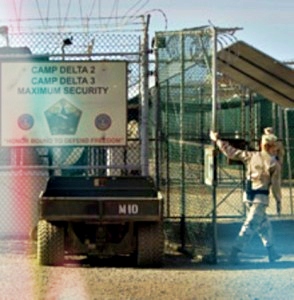
Guantanamo Bay Prison: 30 Suspects Remain
Once a front-page story, the U.S. prison on Guantanamo Bay is seldom in the news these days or, apparently, on the minds of the American people. But it certainly should be. Because the history and on-going operation of Guantanamo Bay Prison, or “GITMO” as it is often called, exposes the lie behind our claim to be a nation governed by the “rule of law”. Condemned by Human Rights Watch, Amnesty International, and many other such groups, it is a permanent stain on the character of the American people.
Since 2002, at the height of its operation, close to 800 captives from many different Muslim nations were held there under tortuous conditions as “suspects” rather than being classified as “prisoners of war”, which they clearly were, and accorded all of the rights they were entitled to as prisoners of war. The youngest was 13 years old! In fact, 21 of the detainees were children. All of the detainees were subjected to barbaric forms of torture. Some committed suicides. Hundreds were convicted in sham trials and in illegitimate military tribunals. Many, if not most suspects, clearly bore no responsibility for combat operations in the Muslim nations where we were waging war.
Today, about 30 suspects remain in the U.S. prison on Guantanamo Bay. Sixteen are “cleared for release”, but it has not yet been made clear to what country they can be released. Three have not been charged, nor have they been cleared for release. And nobody can reasonably predict when, if ever, they will be freed. And in the latest shameful twist, Defense Secretary Lloyd Austin has now upended a plea deal for the three prisoners accused of plotting the 9/11 attacks. It would have allowed the men to plead guilty and be sentenced to life in prison…and instead, given Austin’s intervention, they will now face the death penalty if they are tried and convicted.
Clearly, GITMO is a consequence of America’s imperialist wars in Muslim countries, wars for those Muslim countries’ oil, and for geopolitical gain. Of course, over the many years of these wars, U.S. presidents have repeatedly claimed that we are not at war with Islam. Well, tell that to the families of the millions of dead and wounded Muslims our bombing and invasion of Iraq and Afghanistan caused; tell it to the thousands of Muslims forbidden to enter America through travel bans; tell it to the countless numbers of Muslim citizens and residents of America, who’ve been discriminated against at work or in public; tell it to the Muslim children attacked on their way to school and called “terrorists;” or, tell it to the Muslim worshipers whose mosques have been infiltrated by government spies.
And…for that matter… tell it, as well, to the Palestinian Muslims. Because America’s desire for Mideast oil is also a big reason why Israel exists in the Middle East. A big reason why the United States has partnered with it in its war on the Palestinian people, and why we’ve sent billions in military aid to Israel over the years to keep Israel secure in its role as our “advanced military force” in the oil rich Middle East.
Guest – Shane Kadidal, a Senior Managing Attorney of the Guantanamo Project, at the famed Center for Constitutional Rights in New York, where he has worked on several significant cases arising in the wake of 9/11, including the Center’s legal challenges to the indefinite detention of men at Guantanamo.

—————————
Civil Liberties, Gaza, genocide, Human Rights, Supreme Court, Targeting Muslims, U.S. Militarism, Violations of U.S. and International Law, War Resister
Podcast: Play in new window | Download
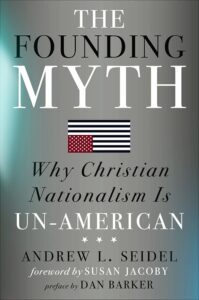
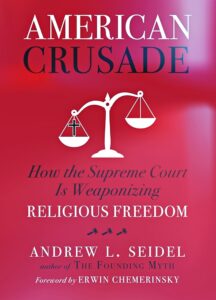
Religious Nationalism and Separation of Church and State
The separation between church and state is a key component of our democracy, ensuring that freedom of belief is a right for all, not a privilege for some. The First Amendment’s establishment clause, “Congress shall make no law respecting an establishment of religion,” has been understood to prohibit the government from establishing an official religion or favoring one religion over others. This interpretation aims to ensure that the government remains neutral in religious matters and does not interfere with or support religious activities, thus maintaining a clear separation between religious institutions and government functions. Despite this, recent rulings by the right-leaning Supreme Court blur the lines between church and state and threaten to undermine this doctrine.
The rise of white Christian nationalism contributes to the degradation of the principle of separation of church and state. This movement reflects broader cultural and demographic trends and exerts significant influence on policy, public discourse, and grassroots movements. Addressing this issue involves understanding the underlying causes and promoting policies that uphold the constitutional commitment to religious neutrality and freedom.
Guest – Attorney Andrew Seidel, is the Vice President for Communications at Americans United for Separation of Church and State, an organization that challenges threats to the First Amendment. He is also the author of two acclaimed books: The Founding Myth: Why Christian Nationalism Is Un-American and American Crusade: How the Supreme Court is weaponizing Religious Freedom.
—-

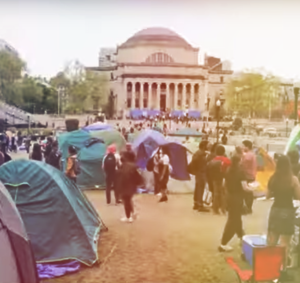
Bend The Arc: Jewish Action
Hamas’ brutal attack on Israel on October 7 and Israel’s deadly and sustained military assault on Gaza have had significant consequences in the United States affecting the presidential election and triggering protests and counter-protests at hundreds of college campuses across the country.
It has also presented a serious test for progressive Jews and progressive Jewish organizations in the United States. One of those organizations is Bend the Arc which describes itself as “building a multiracial, multi-ethnic, inter-generational movement of Jews and allies all across the country who are rising up to build an American future free from white supremacy, antisemitism, and racism.” The Bend the Arc family of organizations includes a C3, C4 and a PAC, and in the past, I served as national chair of Bend the Arc’s C3 board and am currently active in its work in the California Chapter.
Until now, Bend the Arc had a strong boundary around working only on domestic economic and racial justice issues. But that all changed on June 4. On that day, Jamie Beran, CEO of Bend the Arc , sent a letter to President Biden. The letter welcomed Biden’s support for a permanent ceasefire plan in Gaza, but quickly added that, “Time and time again, despite your calls to end this violence, you have not followed through with material action. With over one million Palestinian refugees now being forced to flee Rafah, their last guaranteed refuge, thousands of lives lost, and families of captives being fined in Israel for demanding a ceasefire, it is long past time to end U.S. support for these attacks. Now is the moment to make good on your promise to stop providing offensive weapons to the Israeli military.”
Guest – Jamie Beran, is a leader in the Jewish social justice space. Jamie has built justice organizations that embody their values inside and out. She has held many roles at Bend the Arc in her 15-year tenure, including 9 years of executive leadership, most recently as Chief Operating Officer prior to becoming CEO. Prior to joining Bend the Arc, Jamie was the Leadership Development Director for Habonim Dror North America. Jamie holds a BA from Goucher College and is an alumna of UJA Federation’s and Columbia Business School’s Institute for Jewish Executive Leadership. Jamie lives in Central New Jersey with her husband and two children.

—————————————
Civil Rights, Human Rights, Prison Industry, Supreme Court
Podcast: Play in new window | Download
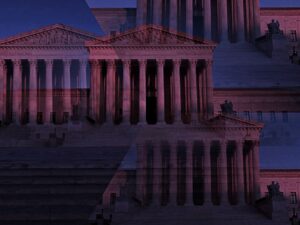
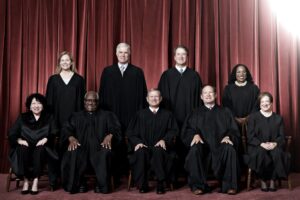
Two Very Important Supreme Court Decisions
When does the government cross the line from using its highly visible bully pulpit to advocate for policies and principles it has every right to promote into the prohibited zone of threatening to use its awesome powers to punish viewpoints it opposes by coercing others to refrain from doing business with the speaker.
In two very important recent decisions, the U.S. Supreme Court was asked to decide whether it is still the law of the land that a government entity’s “threat of invoking legal sanctions and other means of coercion” against a third party “to achieve the suppression” of disfavored speech violates the First Amendment.
In National Rifle Association v. Vullo, in a rare unanimous opinion written by Justice Sonia Sotomayor, the Court held that “Government officials cannot attempt to coerce private parties in order to punish or suppress views that the government disfavors.”
But the decision in the related case of Murthy v. Missouri, was not unanimous. In that case a federal district judge had ruled that the U.S. Surgeon General (Vivek Murthy) and other government officials violated the First Amendment by seeking to convince social media platforms to remove content the government deemed disinformation about COVID, the 2020 election and other subjects.
But on June 26, the Court punted. A 6 member majority – made up of both conservatives and liberals – held that the plaintiffs did not have standing. In dissent, three conservative justices said they would have found standing and on the merits they would have found a First Amendment violation.
Guest – Attorney David Cole argued the NRA case in the Supreme Court. He’s been the National Legal Director of the American Civil Liberties Union (ACLU) since 2016. He previously served as a staff attorney for the Center for Constitutional Rights. He has litigated a wide array of major civil liberties controversies and has personally argued 8 cases before the US Supreme Court and served as counsel in more than 30.
—-
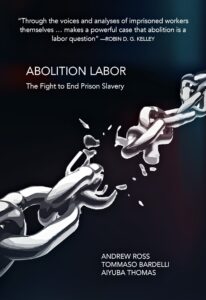
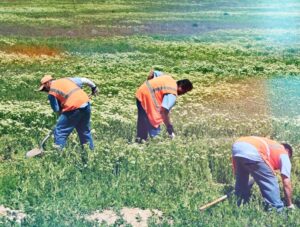
Abolition Labor: The Fight To End Prison Slavery
Operating in the secrecy of the nation’s more than 1,800 prisons, a kind of shadow slave culture is being fostered. Few Americans are aware of the exploitative and pervasive practice of forced prison labor. The 13th amendment to the US Constitution abolished slavery, but it made one exception: prison labor.
Prisoners are forced to work with minimal or non-existent wages, and often with no labor protections. Understanding the scope and implications of forced prison labor is crucial for anyone concerned with social justice and equity. It calls for a re-examination of our treatment of incarcerated persons and for alternatives that promote fairness for everyone, regardless of their legal status. By shining a light on this issue, we can advocate for reforms that prioritize rehabilitation over punishment and strive towards a more just and humane criminal justice system. A new book, Abolition Labor: The Fight To End Prison Slavery, provides an eye-opening overview of the extent of this problem.
Guest – Andrew Ross is a renowned social activist, author, and Professor of Social and Cultural Analysis at New York University, where he also directs the Prison Research Lab. Andrew has contributed to prominent publications like The Guardian, The New York Times, and The Nation. He has authored or edited over twenty-five books, with the recent work, Abolition Labor, co-authored with Aiyuba Thomas and Tommaso Bardelli.
Guest – Aiyuba Thomas recently earned his M.A. from NYU’s Gallatin School of Individualized Study and is an affiliate of the NYU Prison Research Lab. He currently serves as project manager for the Movements Against Mass Incarceration’s archival oral history project at Columbia University. There, he documents the experiences and challenges faced by those affected by the criminal justice system. His firsthand perspective and his extensive knowledge on the subject makes him a powerful voice in the conversation of abolishing forced prison labor.
—————————————-
Civil Liberties, Civil Rights, Gaza, genocide, Human Rights, Supreme Court, Targeting Muslims, War Resister
Podcast: Play in new window | Download
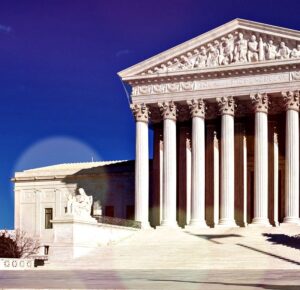

Legal Analysis Of Recent Supreme Court Decisions
The U.S. Supreme Court, securely under the control of a Super Majority of 6 conservative Republican justices, three of whom were appointed by Donald Trump, continues to play a decisive role in undermining our constitutional democracy. This ominous trend continues based on three recent key cases, which we’ll be talking about today.
In one, the Court on March 4 rejected a lower court ruling that Trump was ineligible to run for president; in April the court will hear oral arguments on Trump’s claim of absolute immunity from criminal liability; and recently the Justices heard argument over whether social media sites had a right to ban Trump and others under their content moderation standards.
All of these cases arise from the insurrection on Jan. 6, 2021, when a mob of thousands stormed the US Capitol to prevent Joe Biden from being certified as President. That day, and for many months before and after, Donald Trump attempted to interfere with the constitutionally mandated process for the election of the President of the United States. Hanging in the balance of these three cases are some of the most momentous issues facing our democracy.
Guest – Stephen Rohde is a noted constitutional scholar and activist. He is the past Chair of the ACLU Foundation of Southern California; one of the founders and current Chair of Interfaith Communities United for Justice and Peace; and the author of American Words of Freedom and of Freedom of Assembly. Steve Rohde is also a regular contributor to the Los Angeles Review of Books, and to TruthDig, and a leader in the national campaign to free the imprisoned investigative journalist, Julian Assange.
—-


The Right To Boycott Israel
The First Amendment gives citizens the right to boycott, as well as the right to free speech and assembly and the separation of church and state. The right to boycott is under attack by right wing anti-democratic forces. Anti-boycott bills have been passed in 37 states so far. The main organization behind canceling our constitutional right to boycott Israel for its horrific crimes against Palestinians is the American Legislative Exchange Committee (ALEC). Its a well-funded right wing outfit with considerable power.
Today we speak with leading Palestine solidarity activist Felice Gelman. She helped produce and direct the five minute video called the Right to Boycott. It is a strategic tactic to oppose Israeli crimes against Palestinians.
The boycott started with the Boston Tea Party. The Montgomery Bus Boycott set off the civil rights movement in the south. The Grape Boycott supported Cesar Chavez and the farmworkers in California. The necessity of pushing back against Israel’s genocidal practices has never been more evident.
Guest – Felice Gelman is a coordinator of the Freedom2Boycott NYS Coalition, which has worked for a decade to defeat legislation penalizing boycotts in New York State and recently released a short film The Right to Boycott. She is a board member of the Friends of the Jenin Freedom Theatre, supporting The Freedom Theatre in the West Bank of Occupied Palestine. She was the co-producer of the first full length documentary filmed and directed by Palestinian filmmakers in Gaza, Where Should the Birds Fly?
Hosted by attorneys Michael Smith and Maria Hall

——————————
Censorship, Civil Liberties, Civil Rights, FBI Intrusion, Gaza, Supreme Court
Podcast: Play in new window | Download
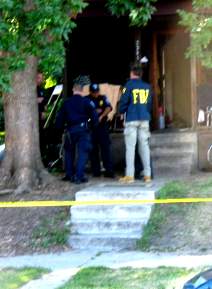

Sealed Search Warrant After Raiding Journalist’s Home Leaves News Gatherers Timid
At 6 a.m. on May 8, seven FBI agents with guns drawn raided the home newsroom of Florida journalist Tim Burke. For nearly 10 hours, they seized computers, phones, video equipment and other devices. The raid came on the heels of Burke’s obtaining outtakes of Tucker Carlson’s interview with Ye (formerly known as Kanye West). In those outtakes, Ye made antisemitic and other offensive remarks. The FBI investigation involves alleged violations of the Computer Fraud and Abuse Act, or CFAA.
It is not clear why prosecutors believe Burke, who runs the media company Burke Communications, broke the law. That’s because the government successfully fought to keep the affidavit supporting the search warrant sealed from public view. As listeners may recall, the CFAA is the federal law that prohibits unauthorized access to a computer. Burke has said he got the outtakes from websites where Fox News uploaded unencrypted live streams to URLs that anyone could access, using publicly accessible login credentials.
In response to the raid, more than 50 organizations sent a letter to the Department of Justice in October demanding transparency about the government’s basis for believing that Burke’s newsgathering broke the law. Florida’s First Amendment Foundation and the ACLU took the lead on the letter, with the Committee to Protect Journalists, Reporters Without Borders, PEN America, the Electronic Frontier Foundation and the Society of Professional Journalists, among others, also signing on.
Guest – Seth Stern, Advocacy Director at the Freedom of the Press Foundation (FPF). Prior to joining FPF, Seth practiced media and First Amendment law in Chicago for more than a decade. Before that, he worked as a reporter and editor in the Chicago and Atlanta areas.
—-
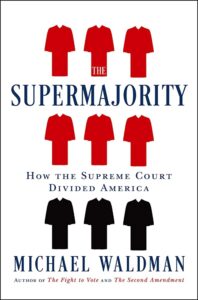
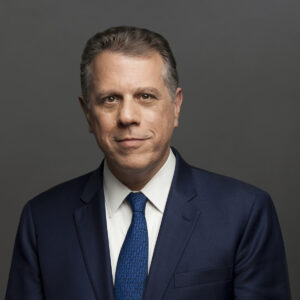
The SuperMajority : How the Supreme Court Divided America,
In late June 2022, a package of Supreme Court decisions drastically altered the nation’s legal landscape and divided the nation. It took just three days to roll back some of the most consequential gains for civil rights, voting, the separation of church and state, a woman’s right to choose, and more.
In his new book The SuperMajority : How the Supreme Court Divided America, Michael Waldman offers an in-depth analysis of the 2022 key rulings and the radical ways in which they were crafted. He provides historical context for how the Supreme Court has amassed power far beyond what the Framers intended, and how the current supermajority ascended to the high court. Waldman also points to previous Courts (on both the right and the left) that overreached and describes their consequences for the country. Significantly, he writes that the seizure of so much power by a few members of the Court, and their energetic wielding of it, poses a crisis for U.S. democracy.
A backlash against the Court is underway. Rather than seeking a supermajority of their own, Waldman writes that, “Liberals must fall out of love with the Supreme Court.” He recommends reform measures to curb the Court’s power while applying other pressure points – such as in the court of public opinion.
Guest – Michael Waldman is the president and CEO of the Brennan Center for Justice at NYU Law School, a nonpartisan law and policy institute. An expert on the Constitution and the courts, Waldman served on President Joe Biden’s commission on the Supreme Court. He is the author of The Fight to Vote and The Second Amendment: A Biography. Waldman was director of speechwriting during the Clinton administration. Sign up for newsletter – Briefing
Hosted by attorneys Heidi Boghosian and Marjorie Cohn

———————————–
Civil Liberties, Civil Rights, Human Rights, Supreme Court
Podcast: Play in new window | Download
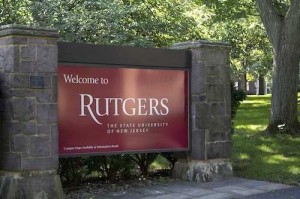
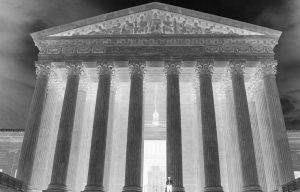
How Affirmative Action Programs In Colleges and Universities Were Overturned
On June 28, the Supreme Court made front page headlines for gutting race-based affirmative action in colleges and universities. The decision rejected race-conscious admissions at Harvard College and the University of North Carolina. The Court’s conservative supermajority ruled in favor of Students for Fair Admissions, a nonprofit founded in 2014, that sued Harvard and the University of North Carolina over their admissions programs. The group, headed by right-wing activist Edward Blum, alleged that the programs violated Title VI of the Civil Rights Act of 1964 by discriminating against Asian American applicants in favor of white applicants.
Paving the way for overturning 40-years of legal precedent was one group that we’ve covered for years on Law and Disorder: The Federalist Society for Law and Public Policy Studies. This conservative, libertarian organization advocates for a textualist and originalist interpretation of the U.S. Constitution. Over several decades, until recently working under the radar, the Federalist Society has dramatically altered the legal landscape in this country.
Guest – civil rights attorney Michael Avery, co-author with Danielle McLaughlin of the 2013 book, The Federalist Society: How Conservatives Took the Law Back from Liberals, and a recent article in Truthout co-authored with Prof. Mark Brodin on the Federalist Society’s attacks on affirmative action. Professor Emeritus at Suffolk University Law School, Michael was president of the National Lawyers Guild and served as president of the board of the National Police Accountability Project.
—-
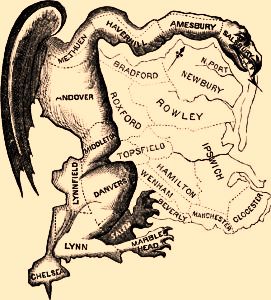
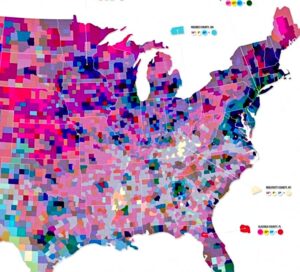
Here’s What “Moore v. Harper” Means for Voting Rights Going Forward
On June 27, the U.S. Supreme Court decided a case that protected voting rights from an obscure theory that could have eliminated the right of state courts to review new voting provisions enacted by state legislatures.
In Moore v. Harper, a 6-member majority of the high court rejected the “independent state legislature” doctrine. Conservative legislators in North Carolina had sought to maintain an extreme gerrymandered congressional map they had drawn that favored Republicans.
Although Chief Justice John Roberts has a track record of decisions that weakened the right to vote, he wrote the Court’s opinion in Moore, as well as in Allen v. Milligan on June 8, both of which strengthen voting rights.
Guest – Marjorie Cohn wrote the article titled, Here’s What “Moore v. Harper” Means for Voting Rights Going Forward, that was published by Truthout. Marjorie is professor emerita at Thomas Jefferson School of Law, former president of the National Lawyers Guild, and a member of the Bureau of the International Association of Democratic Lawyers. She is also on the advisory boards of Veterans for Peace, Assange Defense, and the American Association of Jurists. She writes frequent articles and provides commentary about legal and political issues. Marjorie’s most recent book is Drones and Targeted Killing: Legal, Moral, and Geopolitical Issues.
Hosted by attorneys Heidi Boghosian and Marjorie Cohn

———————————–






















